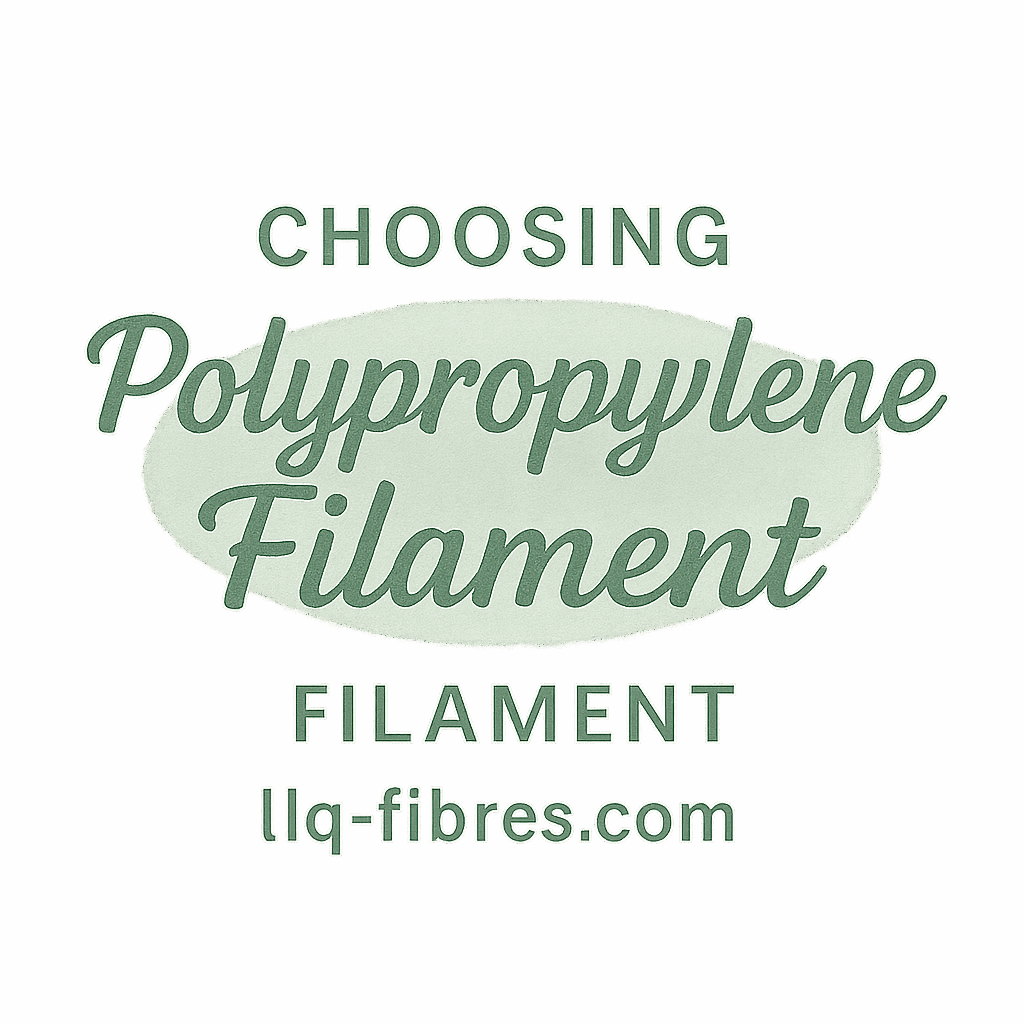Introduction: Understanding Polypropylene Filament & Its Role in Farming
In the agricultural world, ropes are more than just a tool—they are essential for ensuring smooth farming operations. Whether it’s securing crops, managing livestock, or supporting irrigation systems, ropes are involved in numerous farming activities. Among the many types of ropes available, polypropylene filament ropes have gained popularity due to their superior durability, flexibility, and cost-effectiveness. If you’re managing a farm or working in agriculture, you’re likely to encounter polypropylene ropes in various applications. This article delves into five ideal rope applications for polypropylene filament in farming and explains why these ropes are becoming the go-to solution for many farmers.
Why Choose Polypropylene for Agricultural Ropes?
Before diving into specific applications, let’s understand why polypropylene ropes are a standout choice in agriculture.
- Durability: Polypropylene filament ropes are known for their high tensile strength and resilience, making them the perfect choice for the tough demands of farming.
- Resistance to Weather: Unlike many natural fibers, polypropylene is highly resistant to water, UV rays, and harsh weather conditions. This makes it an excellent choice for outdoor agricultural applications where exposure to the elements is a constant factor.
- Cost-Effectiveness: One of the most attractive features of polypropylene ropes is their affordability. Farmers on a budget can access high-quality ropes without sacrificing performance or durability.
- Sustainability: As a recyclable material, polypropylene helps reduce waste in farming operations, contributing to more eco-friendly farming practices. Learn more about sustainable practices with our guide on eco-friendly farming tools.
What is Polypropylene Filament?
Polypropylene filament is a synthetic thermoplastic material that’s both lightweight and strong. It’s made from the polymerization of propylene monomers, which results in a filament that can be woven into durable, flexible ropes. This material is widely used across industries, and its properties make it ideal for agriculture-related applications. When used in ropes, it provides a long-lasting solution that withstands the test of time, even in demanding farming environments. You can explore the various types of ropes and their applications in our comprehensive guide.

Application 1: Livestock Fencing and Enclosures
A major use of polypropylene ropes in farming is in livestock fencing. Keeping livestock within designated areas is essential for farm management, and polypropylene ropes are ideal for this purpose.
- Benefits of Polypropylene Ropes for Fencing: These ropes are incredibly strong and can withstand the pulling forces exerted by animals like cows, horses, and sheep. Polypropylene ropes are also lightweight and flexible, allowing farmers to create fences that are easy to install and adjust.
- Durability in Harsh Weather: One of the key advantages of polypropylene ropes is their resistance to UV rays and water. Unlike traditional natural fibers that can degrade in the sun or rot when exposed to moisture, polypropylene ropes hold up well under extreme conditions.
For more information on durable ropes for farming, check out our buying guide for agricultural ropes.
Application 2: Harvesting and Securing Crops
In farming, securing crops for storage or transportation is vital. Polypropylene ropes help secure harvested crops, preventing damage and making transportation easier and safer.
- Securing Crops for Transport: Polypropylene ropes are often used to bundle harvested crops such as hay, vegetables, and fruits, ensuring they remain intact during transport. These ropes are strong enough to handle the weight of multiple bundles without breaking.
- Preventing Damage During Storage: By using polypropylene ropes to secure crops in storage, farmers can avoid the risk of crushing or bruising delicate items, such as fruits. Polypropylene’s non-absorbent nature also prevents mold growth, which can be a problem with other materials.
If you’re looking for more tips on crop storage, check out our guide to storing farm produce.
Application 3: Irrigation System Support
Proper irrigation is essential for successful farming, and polypropylene ropes play a key role in maintaining efficient irrigation systems.
- Supporting Irrigation Hoses: Polypropylene ropes are often used to secure irrigation hoses or pipes to prevent them from collapsing or kinking. The ropes are durable enough to hold up under the weight and pressure of water flowing through the system.
- Protecting Against Wear: Polypropylene’s ability to resist water and weathering means that ropes used in irrigation setups will last longer without needing frequent replacement, making it an economical option.
For more information about irrigation system maintenance and support, visit our irrigation tips section.
Application 4: Greenhouse Support Structures
Polypropylene ropes are not just for fencing and irrigation—they are also used extensively in greenhouse farming.
- Plant Support: In greenhouses, polypropylene ropes are used to help support plants, especially climbing crops like tomatoes or cucumbers. The ropes provide the necessary strength to hold plants in place as they grow.
- Enhancing Growth: These ropes help improve air circulation and light penetration, which are essential for plant growth in greenhouses. By securing plants to support structures, you also ensure they don’t suffer damage from winds or heavy rain.
To learn more about growing crops in a greenhouse, check out our article on greenhouse farming techniques.
Application 5: Transporting Heavy Equipment
Farm equipment is heavy, and transporting it from one location to another requires strong ropes that can handle substantial weight.
- Rigging Heavy Machinery: Polypropylene ropes are used for rigging machinery, securing equipment during transit, or lifting heavy loads. Despite being lightweight, they are incredibly strong and durable, making them perfect for this application.
- Safe Transport: Whether you’re moving equipment across the farm or loading it onto transport vehicles, polypropylene ropes ensure everything is securely fastened, minimizing the risk of damage.
For more tips on handling heavy equipment on the farm, check out our guide on moving farm machinery.
Polypropylene Rope Maintenance for Farming
Maintaining your polypropylene ropes is key to extending their lifespan and ensuring they remain effective for years.
- Cleaning: Ropes should be cleaned periodically to remove any dirt, dust, or plant debris. Use warm water and mild soap for cleaning.
- Repairing: Minor wear and tear can often be repaired by tying knots or re-weaving the damaged section. For major damage, consider replacing the rope.
- Storage: Store ropes in a cool, dry place away from direct sunlight to prevent UV damage. Proper storage extends the life of your ropes.
For more maintenance advice, check out our rope maintenance guide.
Polypropylene Rope vs Other Materials
When compared to other materials, polypropylene ropes stand out in farming due to their durability and cost-effectiveness.
- Nylon and Polyester: While both nylon and polyester ropes offer strength, polypropylene ropes are generally more affordable and resistant to UV degradation, making them a superior choice for many farming applications.
- Natural Fibers: Though natural ropes like hemp or cotton are eco-friendly, they cannot compete with the durability and weather resistance of polypropylene in outdoor environments.
For a deeper comparison of ropes, check out our guide to choosing the right rope.
Sustainability of Polypropylene in Farming
As sustainability becomes more important in agriculture, polypropylene ropes provide an eco-friendly option. These ropes can be recycled after their life on the farm, contributing to reducing waste.
- Recyclability: Polypropylene can be recycled, reducing the environmental footprint of farming operations. This makes them an excellent choice for eco-conscious farmers.
- Eco-Friendly Practices: Choosing polypropylene ropes supports sustainable farming practices and ensures that you’re making a positive impact on the environment.
Conclusion: Why Polypropylene Ropes are Ideal for Farming
To sum up, polypropylene filament ropes offer a range of benefits, making them an ideal choice for a variety of agricultural applications. From livestock fencing to greenhouse support and irrigation systems, these ropes are a reliable, cost-effective, and durable solution for modern farmers. Whether you are looking to secure crops, transport machinery, or maintain efficient farming operations, polypropylene ropes provide unmatched value.
FAQs
- Why is polypropylene the best material for ropes in farming?
Polypropylene is durable, UV-resistant, and affordable, making it ideal for harsh agricultural environments. - How long do polypropylene ropes last in farming?
With proper maintenance, polypropylene ropes can last several years, even in outdoor conditions. - Can polypropylene ropes be recycled?
Yes, polypropylene ropes are recyclable, contributing to more sustainable farming practices. - Are polypropylene ropes safe for livestock?
Absolutely! Polypropylene ropes are non-toxic, making them safe for use with livestock. - How do I care for my polypropylene ropes?
Clean them regularly, store them properly, and repair any minor damage to extend their lifespan. - Can polypropylene ropes support heavy machinery?
Yes, polypropylene ropes are strong enough to handle the weight of heavy farm machinery during transport. - What are the environmental impacts of using polypropylene ropes?
While polypropylene is a synthetic material, it is recyclable, making it an environmentally friendly option compared to non-recyclable materials.
Ask ChatGPT

